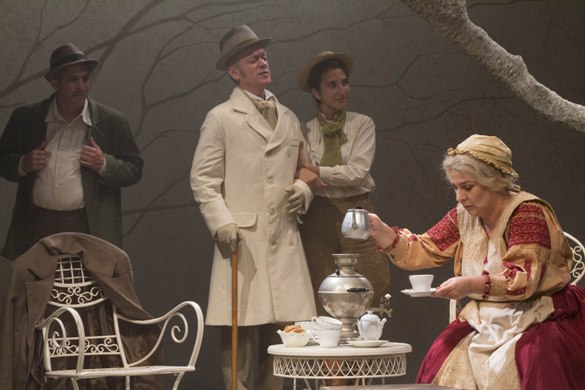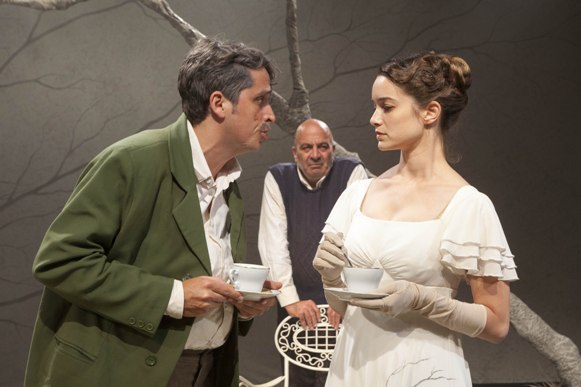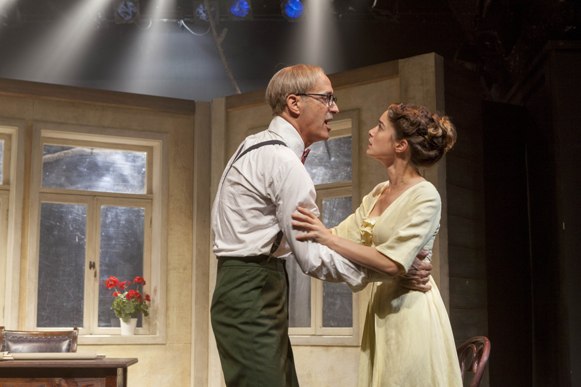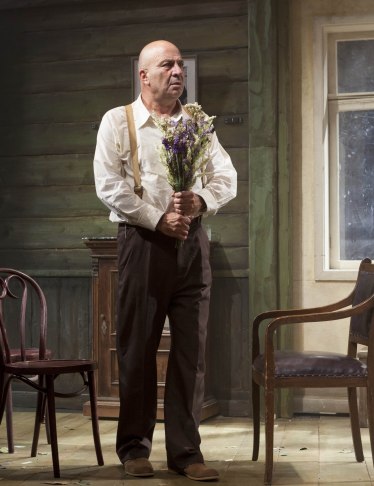The Khan Theatre’s production of Uncle Vanya is luminous, with the quiet clarity of sun breaking through the clouds after a storm. Anton Chekhov’s play, translated by Rivka Meshulah and directed by Michael Gurevitch, is presented with lucid simplicity, rich color and warmth.

The arrival of Professor Serbiakov (Yehoyahin Friedlander) and his lovely second wife Yelena (Daniel Gal) to his country estate one cloudy afternoon, is the harbinger of storms and change. Uncle Vanya (Arie Tcherner), the brother of the professor’s late first wife, and Sonia (Natalie Eliezerov), the daughter of that first marriage, have been managing the estate, providing Serbiakov with the funds to support his life in the city; yet the sustainability of this arrangement is in question.
Suffused with nostalgia and regret, the play is set in pre-revolutionary Russia, in retrospect reflecting a way of life that was soon to disappear. One is always aware of the deep divide between past and present, both in the context of the play and the context of the contemporary viewer, yet Gurevtich’s Uncle Vanya is not at all a period piece. Set and costumes evoke the era yet are not encumbered by it, both are infused with the precision, economy, and detail appropriate to Chekhov’s style.
Svetlana Breger has designed a set that suggests the beauty of the country, realism does not intrude on the painted trees in the background or the walls with windows that do not have to go all the way up to the ceiling, because we know that we are not really in Professor Serbiakov’s country estate, we are in the theatre. Merging art and pragmatism, the walls move to suggest different rooms in the house, and the windows really do open to excellent symbolic effect. The synergy between Gurvitch’s vision for the play and Breger’s set is a pleasure to behold. Maor Zabar’s costume designs express the work of a serious artist, steeped in knowledge of the period and possessed of a creative imagination that understands the power of restraint. The colors are rich and vibrant, from the deep green of Dr. Astrov’s vest to Professor Serbiakov’s creamy pristine linen. One look is all that’s needed to understand Sonia’s place in this household, with her practical high collared shirt and trousers, and one look is all it takes to fall under Yelena’s spell, as she floats by like a vision in a dream.

In the brief moment before one is immersed in the world Chekhov has created, Gurevitch sets up a distance between the audience and the play. Each scene is announced by a different character as it opens. These brief announcements give one pause, a reminder that one is in the theatre. Heightening perhaps one’s awareness of the artistry of the naturalistic scene that is about to unfold, and the performative aspect of life outside the bounds of the theatre.
Contained, and due to inclement weather, confined, in this household are also Maria (Irit Pashtan), Vanya’s not exactly warm mother; the dear old nurse Marina (Odelya Moreh-Matalon); the visiting Dr. Astrov (Nir Ron), called in for the Professor’s rheumatism, he is inclined to remain for the Professor’s lovely wife; and the hanger-on Teleygin (Yoav Hyman), a kind and clueless clown. Considering that the Professor’s wife and daughter are about the same age, and that the men of the household can’t take their eyes off Yelena, the heat of emotions in the house will soon ignite.

The entire ensemble of actors deliver an excellent performance. Irit Pashtan is a paradigm of detachment parenting, too preoccupied with her many texts and pretensions; while Odelya Moreh-Matalon is a warm relic of by-gone better days. Yoav Hyman, buttons bursting, is a tender fool; and Yehoyachin Friedlander is letter-perfect as the academic permanently ensconced in his psychological ivory tower, a devout believer in his own worth. It’s not easy to give your character depth when the defining characteristics are youth and beauty, but Daniel Gal depicts Yelena’s dilemmas with conviction and generates empathy for this trouble-making Helen. Natalie Eliezerov brings heroic vitality and integrity to Sonia, in her love and faith she becomes radiant. Dr. Astrov in some sense frames this story, he is an observer-participant – not a family member, yet inevitably, he is also drawn inexorably to the wasteful lethargy of the household, driven by his own lust. He is most free to walk away, as is the audience, and through the sensitive portrayal of Nir Ron, one experiences the man in his visionary environmentalism, skepticism, and vodka.

Yet it is Arie Tcherner who carries the emotional weight of this play. From Uncle Vanya’s jovial blind pursuit of Yelena and mocking envy of the professor to his awakening to the truth, Tcherner takes a harrowing emotional journey and one cannot help but feel his pain. His eyes burn with passion, blaze with fury, and finally, gazing into an endless abyss of the question: how to endure.

Uncle Vanya conveys a nostalgia for a past that never was, for those cherished past illusions, for what one thought might have been. From the perspective of the contemporary viewer, the effect of the present on the future is expressed in an almost prescient way in Dr. Astrov’s speech on the forests denuded for lumber and fuel, and his hope in planting trees to have “some small share in improving the climate.” Gurevitch’s translucent staging allows one to know and feel these people, to be there with them, yet at the same time to remember that one is here, in the present moment. We have entered their lives, but we are charged with the responsibility of living our own.
Uncle Vanya by Anton Chekhov
Translation: Rivka Meshulach;; directed by : Michael Gurevitch; Set Design: Svetlana Breger; Costume Design: Maor Zabar; Lighting Design: Roni Cohen: Music: Josef Bardanashvili; Dialogue Coach: Noga Yetomi; Cast: Nir Ron (Doctor Astrov), Odelya Moreh-Matalon (Marine, Old Nurse) Arie Tcherner (Uncle Vanya), Yehoyachin Friedlander (Professor Serbriakov), Natalie Eliezerov (Sonia), Yoav Hyman (Ilia Teleygin), Daniel Gal (Yelena), Irit Pashtan (Maria).





